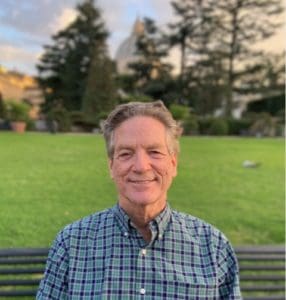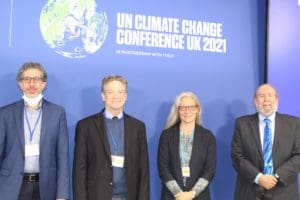Resolving Complex Infrastructure and Environmental Disputes. Member Spotlight: Chris Kane
Chris Kane is an engineer, lawyer and mediator who works primarily in the environmental, infrastructure and climate change space. He is most passionate about working as a mediator and neutral party in resolving complex infrastructure and environmental disputes. He firmly believes that mediation has the potential to transform the international discourse surrounding climate change and sustainability. Read his recent article spotlighting his work: The “Need for Speed” in Solving Flood Control and Resiliency Challenges
From Engineering to Law

Chris comes from a military family, and is one of eight children. His family traveled throughout his childhood with his father’s career in the army, and had a long-standing family tradition of service. Chris maintained the tradition, studying at West Point and serving in the U.S. Army Corps of Engineers for five years and became a licenced engineer, and worked in engineering while completing his law degree. His first jobs after law school were in engineering and construction companies, until he began practicing law at a firm in Washington, D.C. His career has been following two general paths: developing and negotiating complex project agreements for infrastructure projects, and acting as a neutral mediator and arbitrator in resolving conflicts. Chris has been a member of the American Arbitration Association’s Mediation and Arbitration panels since 1994, on a mediator panel at CPRADR and a roster for the Environmental Protection Agency for conflict resolution. Chris has had his own business P3 Collaborative LLC since 2009, when he opened his full time project development and mediation practice.
MBBI
He joined MBBI around 2009 in hopes of building his practice after meeting Brad Roth while speaking about alternative dispute resolution at a college in New York City. In February, 2021 he rejoined MBBI after hearing about the Climate Change Project and MBBI’s participation as observers in the U.N. Conference of Participants (COP). This work tapped into Chris’s primary interest in environmental action and addressing the issue of climate change. Through the Climate Change Project, Chris was able to attend the U.N. COP 26 in Glasgow Scotland, along with Christine Peringer, Joe Siegel, Gregg Walker, and many more MBBI members. He found COP 26 “to be the experience of a lifetime.” He loved being able to observe the challenges that come with trying to bring 196 nations to a “consensus agreement”, and was able to meet and better connect with some MBBI colleagues at the conference. This experience, he says, motivated him to become even more involved in mediation and serving as a neutral facilitator and conciliator in the climate change space.
Pivoting to Environmental Mediation
 Chris pursued law school because he thought that law would be a good way, in combination with his engineering background, for him to get more deeply involved in engineering and environmental conflict resolution. Before deciding to attend law school he read an article about environmental mediation, which greatly interested him, and made a law degree a logical step in participating in that arena. Environmental mediation interested him as he felt able to see “all these things coming together; technical, social, economic, environmental issues and felt like I could contribute to help solving those complex problems.” Chris has loved his work in the legal sphere, but his true passion is working as a neutral party rather than representing one side, particularly when it comes to climate and environmental issues. Chris explains that there are massive potential climate benefits that can come out compromise and international mediations, and showing countries that there are opportunities for mutual gains and economic benefits in pursuing sustainability. He believes that this will become a reality much quicker through a mediation-focused processes, rather than adversarial ones, and that mediation has an ever-expanding future in the climate realm.
Chris pursued law school because he thought that law would be a good way, in combination with his engineering background, for him to get more deeply involved in engineering and environmental conflict resolution. Before deciding to attend law school he read an article about environmental mediation, which greatly interested him, and made a law degree a logical step in participating in that arena. Environmental mediation interested him as he felt able to see “all these things coming together; technical, social, economic, environmental issues and felt like I could contribute to help solving those complex problems.” Chris has loved his work in the legal sphere, but his true passion is working as a neutral party rather than representing one side, particularly when it comes to climate and environmental issues. Chris explains that there are massive potential climate benefits that can come out compromise and international mediations, and showing countries that there are opportunities for mutual gains and economic benefits in pursuing sustainability. He believes that this will become a reality much quicker through a mediation-focused processes, rather than adversarial ones, and that mediation has an ever-expanding future in the climate realm.
Beginning his career in law, Chris has seen the contrast between the legal and mediation processes first hand. He explains that he went into law to become a better businessperson and also to become more involved in mediation, rather than to become a litigator. He knew that the legal industry was based generally on conflict, but came to learn that there are many lawyers who value mediation and encourage their clients to make use of it. Chris explains that his biggest professional challenge has been figuring out how best to break away from traditional legal work to focus more heavily on mediation. He says that his approach to law is best described by a much cited 1850 Abraham Lincoln quotation: “Discourage litigation. Persuade your neighbors to compromise whenever you can. Point out to them how the nominal winner is often a real loser – in fees, expenses, and waste of time. As a peacemaker the lawyer has a superior opportunity of being a good man. There will still be business enough.”
Article by Tess Hargarten, MBBI Writer
